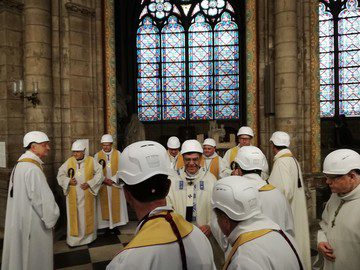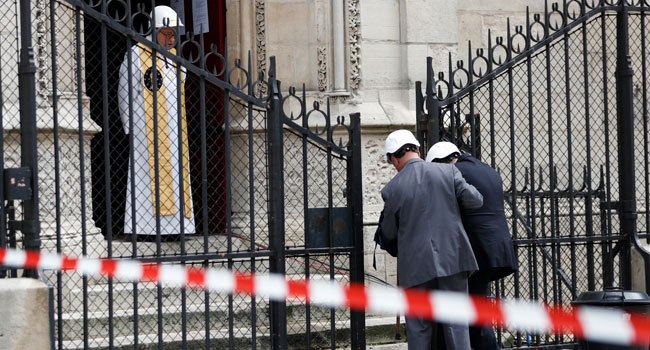
The Notre-Dame cathedral in Paris hosted its first mass on Saturday exactly two months after a devastating blaze that shocked the world, with priests and worshippers wearing hard hats to protect themselves against possible falling debris.
Dressed in a white robe and helmet, Archbishop of Paris Michel Aupetit led the service, which was attended by just some 30 people — half of them clergy.
The mass started at 6:00 pm (1600 GMT) in the Chapel of the Virgin on the east side of the cathedral, confirmed to be safe. It was broadcast live on Catholic TV channel KTO.
Aupetit was joined by the rector of Notre-Dame, Patrick Chauvet, other clergy, volunteers, people working on the restoration as well a handful of lay worshippers.
The date was chosen as it is the anniversary of the consecration of the cathedral’s altar, which is celebrated every year on June 16.
The date is “highly significant, spiritually,” Chauvet told AFP, adding he was happy to be able to show that “Notre-Dame is truly alive”.
‘Inventive’ reconstruction
President Emmanuel Macron has set an ambitious target of five years for restoring Notre-Dame, which was gutted by a fire on April 15 that felled its steeple and consumed the lattice of beams supporting the roof.
The diocese is awaiting a response from the French authorities over whether it can re-open the esplanade in front of the cathedral to the public.
If the authorities approve the plan, the idea is to celebrate evening prayers there, the diocese said.
The church has also floated the idea of erecting a temporary structure in front of the cathedral to welcome worshippers while the building is being repaired.
Up to 150 workers have been working at the cathedral daily since the fire, continuing to remove debris and stabilise the structure.
Two large white canopies have been placed above the nave and the choir to ensure the edifice is protected, including from the rain.
Macron’s call for an “inventive” rather than identical reconstruction of the steeple has left some architects up in arms.
Meanwhile, legislation over the reconstruction has been blocked in parliament over disagreements between the upper and lower houses and is now only expected to be adopted at the end of July.
Pledges of some 850 million euros ($960 million) had been made from prominent French businessmen and ordinary citizens but only around 10 percent of that has been donated so far.
France Info public radio said just 80 million euros had been handed over, with businessmen giving the money in tranches and some private individuals renouncing their pledges due to the apparent success of the campaign.

